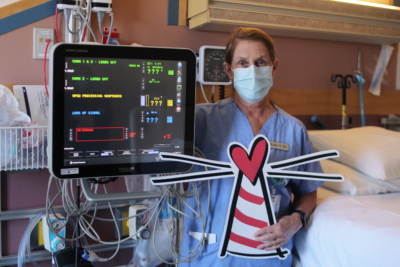The work in the Intensive Care Unit (ICU) is high-tech, fast-paced, and critical — and Kathy Ogden loves it. After graduating from the Yarmouth School of Nursing in 1978, Kathy was a nurse for 20 years when she took an assignment in the ICU and fell in love. She’s still in love with this position even after 25 years, so much so that she’s not ready to retire 10 years after she became eligible.

There are seven patient rooms and one treatment room in ICU, which allows for a variety of procedures, even the installation of temporary pacemakers. ICU is for critically ill patients, often those with heart or respiratory illnesses and those needing new acute dialysis requiring additional monitoring. These patients often require one-on-one care from a nurse, or perhaps one nurse can look after two or even three patients — but no more.
Kathy has been team leader for 10 years. While the nurses work 12-hour shifts — four on days, four on nights — the team leader works 7-3 Monday through Friday. Given her knowledge base and experience, she can provide support and advice to the other nurses. She also handles needed paperwork and fills in when a nurse needs assistance or a break.
In addition, up to 12 patients also can be monitored on 3-East or 3-South, and that’s because they have monitors that are connected to ICU. “We in ICU monitor them to determine if they need help, from asking the floor nurses to check on them to rushing to the bedside to deal with a critical development. We keep a close eye on them to determine if they need help and what kind,” Kathy says.
Years ago, many ICU patients would have been transferred to Halifax or Kentville for specialized care, but that happens much less often, Kathy says. “Now they can be treated right here at home,” she says. She attributes this to technological improvements and to the fact that ICU now has more internal medicine doctors, including a cardiologist and an intensivist, along with internal medicine fellows (doctors completing their training).
She credits the Yarmouth Hospital Foundation for funding many of the machines and devices that provide life-saving care — from the portable ultrasound that is used daily to ceiling lifts to special chairs that allow patients to sit up properly. “I get excited when we get some new equipment that the foundation has purchased,” Kathy admits. “The foundation has been very supportive when the need is there.”



